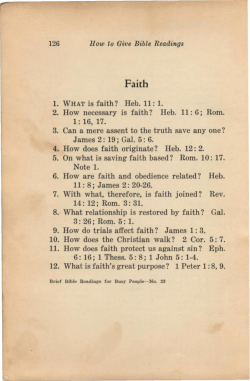
MILLENNIAL FAITH PARTICIPATION AND RETENTION Young Adults Who Leave the Faith
Where research meets common sense August 2013 MILLENNIAL FAITH PARTICIPATION AND RETENTION Young Adults Who Leave the Faith Growth Found in Bible Teaching Churches 11% Mainline Churches + 0.60% 89% Conservative Churches - 2.20% Those who had a strong faith as a child Those who didn’t have a strong faith as a child Majority Staying — More Switching Than Leaving Religiously Unaffiliated Continue to Grow 20% 18% 58% 17% 20% 4% Leaving Faith Switching Faith Coming to Faith Keeping Faith 7% 9% 8% 3% 1970 1980 1990 2000 2010 2012 EXECUTIVE SUMMARY Many are quite pessimistic that today’s parents will be able to pass on lasting faith to their children. Some experts are even spreading doomsday narratives in this regard. Faith leaders and parents have responded with anxiety, assuming that raising kids with lasting faith is unlikely. The doomsday narratives, however, are grossly overstated. The truth lies somewhere between good news and bad news. • Only 11% of those who abandon their childhood Christian faith say they had a very strong faith as a child and came from a home where a vibrant faith was taught and practiced.1 • The General Social Survey finds a significant decline in mainline Protestant churches, but slight growth in conservative evangelical churches.2 • Slightly more young adults are switching their church affiliation than leaving their faith.3 Much of this transition is from one Christian denomination to another, rather than a more dramatic change from one religion to another or to nothing. • Only 18% of young adults raised with any religion are now unaffiliated with a particular faith (i.e. “the nones”).4 • Marital rates and church participation tend to go hand in hand. As one increases, so does the other, strongly linking the health of our families with church growth. THE GOOD NEWS Conservative Protestant churches are actually growing . . . slightly. According to the General Social Survey (GSS) — a nationally representative survey of American adults — conservative Christian churches are increasing slightly (from 30.9% of the U.S. population in 1991 to 31.5% in 2012).5 Of course, this means that the growth rate in real numbers is markedly greater! During this same period, mainline Protestant churches dropped from 21.2% to 19%. These findings are consistent with Pew’s 2008 U.S. Religious Landscape Survey which found, “the proportion of the population identifying with the large mainline Protestant denominations has declined significantly in recent decades, while the proportion of Protestants identifying with the large evangelical denominations has increased.”6 But the real change is among those claiming no particular religious affiliation (the “nones”), which increased from 8.1% to 19.7% of the general population (1991 to 2012).7 Faith in Flux: Change in Religious Affiliation in the U.S. (The Pew Forum on Religion and Public Life, April 2009), 4. General Social Surveys (GSS), data from 1991 and 2012. 3 Millennials, Confident. Connected. Open to Change. (Washington: Pew Internet, 2010), 88. 4 Millennials: 2010, 88. 5 GSS, 1991-2012. 6 GSS, 1991-2012. 7 GSS, 1991-2012. 1 2 August 2013 Page 2 But the nones are not void of faith. While millennials are generally less likely to attend religious services, of those who are affiliated with a particular faith, Pew reports the “generational differences in worship attendance is fairly small.”8 It must be appreciated that millennials are changing location slightly more (20%) than leaving faith (18%). This changing refers to those who are switching from one church to another, usually within their tradition. Even though there has been a jump in the growth of nones, less than a fifth of the millennials are moving from religious affiliation to nothing. They are more likely to shift from a distinct denominational identification to a more general “spiritual” association. Therefore, it’s simply incorrect to conclude that most young adults are leaving. Professor Byron Johnson, from Baylor’s Institute for Studies of Religion, said, “Switching is not an indication that Americans have abandoned or lost their faith, as many in the media and, unfortunately, a number of Christians would have us believe.”9 Curiously, millennials themselves fail to note their own so-called “shifting religious participation.” Notre Dame sociologist Christian Smith, a world leader in this field of study, observes: [M]ost emerging adults themselves report little change in how religious they have been in the previous five years. And those who do report change are more likely to say they have become more, not less, religious.10(emphasis added) Smith continues: [M]ost [millennials] do not appear to abandon their faith, decide that it is entirely unimportant, or radically alter their beliefs. Most appear to retain [but make their faith a less] salient and publically practiced part of their lives during these years.11 Note the phrase, “during these years.” It has long been a hallmark of youth to be less religiously active during the transition from teen years into adulthood. As University of Connecticut Sociologist Bradley Wright has written, “Given the dramatic rise of [the “nones”] since the 1990s, there are far more young Evangelicals than I would have thought. . . . [The] data so far don’t support the disaster narrative so prominently featured in popular Christian writings.”12 Millennials, 2010, 90-91. Byron Johnson. “Exodus from the Church?: A debate on the state of the faith.” Books & Culture. (May 2011). 10 Christian Smith. Souls in Transition: The Religious & Spiritual Lives of Emerging Adults. (Oxford University Press, 2009), 141. 11 Souls in Transition, 2009, 142. 12 Bradley Wright,. “Are We Losing the Young? Evangelicals by Age Since 1972” Black, White and Gray. http://www. patheos.com/blogs/blackwhiteandgray/2013/04/are-we-losing-the-young-evangelicals-by-age-since-1972/ Accessed April 18, 2013. 8 9 August 2013 Page 3 THE BAD NEWS • Eighteen percent of today’s young adults (age 18-29) say they were raised in a religion but are now unaffiliated with any particular faith.13 Nearly all come from homes with lukewarm or nominal faith. • It’s the Mainline Protestant churches that have seen marked declines in participation/ membership in both real numbers and percent of population.14 • The nones have increased from 15% to 20% of the adult population in the last five years.15 However, this story is a bit more complex. Many millennials without specific religious faith identification express beliefs and behaviors demonstrating some type of spiritual belief. Of course, this type of “generalized faith” is not something to celebrate, nor is it necessarily cause for despair. They are not — as some might suggest — becoming hardened atheists or agnostics. They are open to spiritual truths. REASONS FOR CHANGE Young Adults Can’t Keep What They Were Never Given As noted, of those who do leave the Christian faith, very few report having had a very strong religious faith as a child or teenager. Specifically, only 11% of those who abandoned their childhood Christian faith said they were taught a very strong faith during childhood.16 So not surprisingly, homes modeling lukewarm faith do not create enduring faith in children. Homes modeling vibrant faith do. So these young adults are leaving something they never had a good grasp of in the first place. This is not a crisis of faith, per se, but of parenting. This important conclusion from Pew is supported by Smith’s work: Religious outcomes in emerging adulthood are not random happenstance about which all bets are off after age 18. Instead, they often flow quite predictably from formative religious influences that shape persons’ lives in earlier years. . . . [The] religious commitments, practices and investments made during childhood and the teenage years, by parents and others in families and religious communities, matter — they make a difference.17 (emphasis added) Millennials, 2010, 88. GSS, 1991-2012. 15 “Nones” on the Rise: One-in-Five Adults Have No Religious Affiliation (The Pew Forum on Religion and Public Life, October 2012), 9. Note: Gen Xers are those born 1965-1980; Boomers born 1946-1964; Silent born 1928-1945; Greatest born 1913-1927. 16 Faith in Flux, 2009, 4. 17 Souls in Transition, 2009, 256. 13 14 August 2013 Page 4 This is perhaps the most important thing that parents and pastors should know regarding faith retention in young adulthood: Parents who provide a home where faith is vibrantly practiced — even imperfectly — are remarkably likely to create young adults who remain serious Christians, even as they sometimes go through bumpy spots in the road. Why the Bad News? There are a few leading theories for the shifts away from faith that have little to do with faith itself. • Millennials have a smaller engagement with all forms of community participation, which of course includes the church. The religiously unaffiliated are nearly half as likely, compared with the religiously engaged, to say “a community of people who share your values and beliefs” is important (28% and 49% respectively).18 • Millennials are more likely to “think of religious people as hypocritical, judgmental or insincere,” thus dampening their interest and involvement in local bodies of faith.19 • Millennials are increasingly disassociating with churches and individuals who practice what they see as strident conservative political rhetoric. As Marriage Declines, So Does Religious Engagement Other leading scholars conclude that religious disengagement is associated with the trend to postpone marriage and parenthood. For younger (and older) adults, marital rates and religious involvement tend to go hand-in-hand. Princeton’s Robert Wuthnow, a leading sociologist of religion, explains: The overall conclusion, then, is that almost all of the decline in religious attendance . . . has taken place among those younger adults who have not married . . . Our main conclusion . . . was that today’s young adults are divided religiously on lines that correspond closely to their marital status. Young adults who are married go to church and often go to theologically conservative churches. Young adults who are not married are less likely to attend religious services.20 Settling down in family usually means settling down to church. Growing strong marriages and thriving families is an important church growth strategy that cannot be ignored. “Nones” on the Rise, 2012, 31. Robert Putnam and David Campbell. American Grace: How Religion Divides and Unites Us. (Simon & Schuster, 2010), 120-121. 20 Robert Wuthnow. After the Baby Boomers: How Twenty-and Thirty-Somethings are Shaping the Future of American Religion, (Princeton, NJ: Princeton University Press, 2007), pp. 55, 137. 18 19 August 2013 Page 5 Key Conclusions for Ministry 1. Bible-teaching churches continue to see healthy growth. As we saw on page 2, there has been positive growth among churches that clearly teach the truth of Scripture and declines among those which don’t. Conclusion: Be faithful to teaching and honoring God’s Word in a clear and vibrant way. Young adults desire to receive uncompromising truth that calls them to something beyond themselves. 2. Strong families produce lasting faith. Children coming from homes where faith is practiced seriously (but not perfectly) are strongly predicted to carry that faith into adulthood. Conclusion: Create homes where children learn and witness a vibrant faith that’s lived out honestly and intentionally. Perfection is not required, only diligence and faithfulness. 3. The search for ultimate meaning is never outdated. Man has universally, throughout history, asked and sought answers to questions of ultimate meaning. Up and coming generations will continue to do so because they are human. Conclusion: It is up to the church to raise the right questions and provide meaningful answers relative to the times and culture in which we live. 4. Millennials want their faith to be serious, not entertaining. This generation is profoundly entertained from every angle. They want substance from their faith. Conclusion: Young people are looking for assurance and truth rather than stimulation and theatrics. Truth trumps trappings. Andrew Hess is Research Associate for Family Formation Studies at Focus on the Family in Colorado Springs, Colo., and Adjunct Professor of Humanities and Theology at Colorado Christian University. Glenn T. Stanton is the Director of Global Family Formation Studies at Focus on the Family in Colorado Springs, Colo., and the author of Secure Daughters, Confident Sons: How Parents Guide Their Children Into Authentic Masculinity and Femininity and The Ring Makes All the Difference. August 2013 Page 6
© Copyright 2025





















